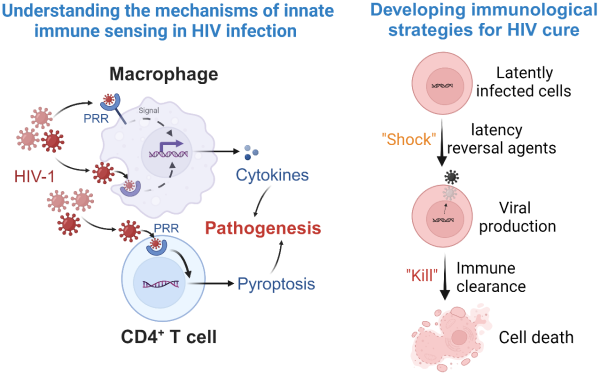
汪乾坤
Qiankun WANG
特聘研究员
qiankun.wang(at)szbl.ac.cn
Timeline
| 2024.03 至今 | 深圳湾实验室传染病研究所 | 特聘研究员 |
| 2018.08-2024.02 | 美国圣路易斯华盛顿大学 | 博士后、讲师 |
| 2018 | 武汉大学 | 博士学位 |
研究领域
目前课题组研究方向为逆转录病毒感染与免疫,主要包括:
(1)逆转录病毒感染的天然免疫应答及其调节机理;
(2)HIV感染的新型免疫治疗策略;
(3)建立病毒感染的人源化小鼠模型。
成果
课题组负责人围绕人类免疫缺陷病毒(HIV)感染的免疫致病机制及新型免疫治疗等方向开展了系统性的研究,主要研究成果包括:发现新的天然免疫模式识别受体CARD8,通过药物特异性靶向激活CARD8炎症小体信号通路,能高效且广谱杀灭HIV感染的细胞,为清除HIV潜伏储存库提供了全新的策略(Science 2021);阐明HIV感染引起CD4 T细胞减少导致人类免疫缺陷的关键分子机制,揭示猴免疫缺陷病毒 (SIV)感染非洲非人灵长类动物不形成艾滋病(AIDS)的可能原因,为开发阻止AIDS疾病进程药物提供了新靶点(Cell 2024)。
荣誉奖励
• 2022 & 2023 Conference on Retroviruses and Opportunistic Infections (CROI) New Investigator Scholarship
• 2021 & 2023 Innate Immunity Keystone Symposia Scholarship
• 2021 HIV Pathogenesis and Cure Keystone Symposia Scholarship
招聘信息
深圳湾实验室汪乾坤课题组招聘公告代表论文
1. Wang Q, Clark KM, Tiwari R, Raju N, Tharp GK, Rogers J, Harris RA, Raveendran M, Bosinger SE, Burdo TH, Silvestri G, Shan L. The CARD8 inflammasome dictates HIV/SIV pathogenesis and disease progression. Cell. 2024 Feb 29;187(5):1223-1237.e16.
2. Wang Q, Gao H, Clark KM, Mugisha CS, Davis K, Tang JP, Harlan GH, DeSelm CJ, Presti RM, Kutluay SB, Shan L. CARD8 is an inflammasome sensor for HIV-1 protease activity. Science. 2021 Mar 19;371(6535):eabe1707.
3. Sungur CM, Wang Q, Ozantürk AN, Gao H, Schmitz AJ, Cella M, Yokoyama WM, Shan L. Human NK cells confer protection against HIV-1 infection in humanized mice. J Clin Invest. 2022 Dec 15;132(24):e162694.
4. Wang Q, Shan L. CARD8 makes coxsackievirus more "heartbreaking". J Exp Med. 2022 Oct 3;219(10):e20221240.
5. Wang Q, Shan L. Inflammasomes in Human Immunodeficiency Virus Type 1 Infection. Infectious Diseases & Immunity. 2022 Oct 20;2(04):248-52.
6. Wang Q, Chen S, Xiao Q, Liu Z, Liu S, Hou P, Zhou L, Hou W, Ho W, Li C, Wu L, Guo D. Genome modification of CXCR4 by Staphylococcus aureus Cas9 renders cells resistance to HIV-1 infection. Retrovirology. 2017 Nov 15;14(1):51.
7. Wang Q, Liu S, Liu Z, Ke Z, Li C, Yu X, Chen S, Guo D. Genome-scale screening identification of SaCas9/gRNAs for targeting HIV-1 provirus and suppression of HIV-1 infection. Virus Res. 2018 May 2;250:21-30.